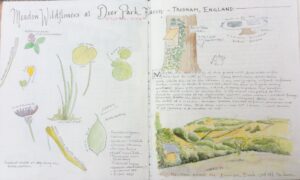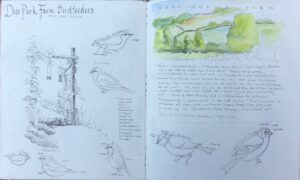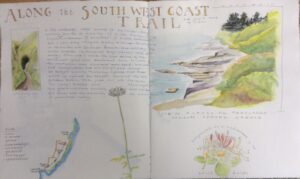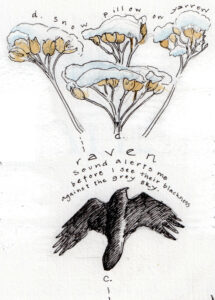From a snug fisherman’s cottage in Mousehole, we explore southwest along the trail, curving our way through shrub fields of bracken and honeysuckle and Apiaceae species. Where the hard granite is exposed, sea thrift and Lotus and a beautiful purple blue flower I can’t identify, soften the hard crystals. On our first full day in Cornwall, the reality of this trail exceeds any expectation I had from my snooping last winter with Google Maps. By the time Marc and I return along the footpath through farmers’ fields (the footpath gated and stoned between dairy barns!), my leg muscles are comfortably sore and I feel the rhythm of this landscape beginning, ever so slightly, to imprint.
Deer Park Farm, England
A conference brings me to England and then it is an extraordinary pleasure to spend days wandering the steep contours of Deer Park Farm in Devon. After the last several years showing and talking about field journal art, I am rediscovering the joys of playing (thinking less about product and more about process) in my field journal. The English countryside is hedge-rowed and exotic, at least to my North American sensibilities. Outside Ash Tree Cottage windows, Coal, Great, and Blue tits visit the feeders, along with clown-coloured Goldfinches (how unlike ours) and Eurasion Nuthatches. In travel, the familiar becomes exotic.


A Solstice Challenge
 My friend Frank Ritcey and I are working on a social engagement/book project called “The 12 Labours of Your-name-goes-here-ules”. It’s like the 12 Labours of Hercules but all the labours are linked to activities in nature. As part of this work we’re gathering all that we can to mark the Winter Solstice on Monday, Dec. 21 from the TRU “Knoll”.
My friend Frank Ritcey and I are working on a social engagement/book project called “The 12 Labours of Your-name-goes-here-ules”. It’s like the 12 Labours of Hercules but all the labours are linked to activities in nature. As part of this work we’re gathering all that we can to mark the Winter Solstice on Monday, Dec. 21 from the TRU “Knoll”.
We’ll meet at 7:45 AM in Parking Lot T (just beside the Trades and Technology Building) and walk up to the Knoll. Bring a pen and paper and we’ll have extra, as well as profiles of the eastern horizon available! Bring your kids and let them begin work on “The Sun also Rises” labour! Follow us on Facebook at: https://www.facebook.com/groups/12labours/.
AND, for those not in Kamloops, Frank and I challenge you all to find your Solstice sunrise. We’d love it even more if you shared images of your Solstice sunrise with us on our Facebook page!
Dewdrop Excursion
The possibility of bighorn sheep in rut lured Marc, Maggie and me out to Dewdrop Range several weekends ago. November’s beginning in Kamloops is as fickle as March’s ending: sporadic warmth belying cold’s imminent possibility. Rather than climbing up into the hills, we dropped down over the side towards Kamloops Lake and found a hidden valley–really just a eroded gully–with more than enough natural history to keep us busy for most of the day.
 Selaginella and Homalothecium grew in dense mats atop a talus slope; a Hairy Woodpecker gleaned from, of all things, a mullein stalk.
Selaginella and Homalothecium grew in dense mats atop a talus slope; a Hairy Woodpecker gleaned from, of all things, a mullein stalk.
As the day wore on, the sun slipped behind and then in front of clouds, casting long shadows across steep slopes.
Running this way and that, bighorn tracks and scat litter this landscape.
When it is time, I pack up pens and paper, brushes and paints, feeling the deep satisfaction that comes with paying close attention to the more-than-human world. A good way, I think, following our new dog Freya up and out of the valley, to spend a Sunday.
Summer Leavings
 View across the North Okanagan from the Mt. Swanson Overlook
View across the North Okanagan from the Mt. Swanson Overlook
Now, when the first snow flies, the leavings of summer I find earlier in my field journal warms my skin and me reminds me of the linkage between the seasons. Winter–summer: different positions on the same orbit. It’s a thought hard to hold as the the wind blows hard against the house and big snowflakes fall. I think so often of my field journal as the tool that allows me to explore the present. Today I am reminded how it can also bring the past forward: a week removed from normal time, surrounded by family, on the north end of Okanagan Lake. This valley is terrain I shared with my sister and brother in our childhood and it feels right to be back here with my siblings and our extended families. Over the course of a week we make time for beachside reading, bird walks along field margins, and a uphill climb through the wetter forest leading up to Mt. Rose and Mt. Swanson. It’s a landscape I know better in memory than in current time, but the view from the Mt. Swanson has surprisingly pull–even now more than 35 years after I once called this valley home.
The fall of Short Creek, cascading down over steep rock is rivaled only by the incline of the wooden steps climbing its height. What a surprise to find crossbills and pine siskins gleaning insects from the watery seeps lining the cliff face. It’s not until I read my notes from our last climb that I remember how hot our visit here was with last summer’s record breaking heat. In summer I wished for the chill of winter; as winter descends, I long for hot August. Is this what I do? Wish away my ability to revel in the present?
Finding Place in Golden, BC June 19-Sept 9
Laura’s Collection
Take a look! One of my illustrated essays just came out in Terrain.org–a favorite journal of mine! I’m unabashedly pleased.
http://terrain.org/2015/nonfiction/lauras-collection-finding-community-through-field-work/
Keeping Track: Nature Journaling as Discovery Workshop (Aug 30, 2014)
I’ve been asked to provide (and am delighted to do so) a nature journaling workshop in the Upper Clearwater Valley at the wonderful property known as Edgewood Blue, just as the summer comes to a close. For those that might be interested, here’s the description
Keeping Track: Nature Journaling as Discovery
Lyn Baldwin
The Wells Gray landscape runs rich with the multi-faceted phenomena of a living, breathing world—phenomena that are all too easy to miss as we pass through immersed in our busy lives. Illustrated field journals (or nature journals) provide the ideal format for us to record the sparkle of individual moments, the pull of unmeasurable phenomena. This hands-on workshop will use a series of drawing and writing exercises to locate ourselves in moment and place. No previous expertise needed, beginners welcome! Participants should bring a sketch book and pencil and pens with which to draw and write. Other portable art supplies (water colour sets, coloured pencils) are optional.
Location: Edgewood Blue, Clearwater Valley Road, Upper Clearwater, BC
Date: Aug 30, 2014, 10:00 am to 4:00 pm
For more information: lybaldwin@tru.ca
Or call the Wells Gray Info Center 250-674-3334
The wrong side of the orbit
I can’t help it; we’ve just passed into spring but there was snow falling all day yesterday and I’ve been playing with images from the other side of the orbit. My appreciation for these two sections of the orbit that we call spring and fall equinox increases with each year. It’s a time of balance–something that is so lacking during winter’s press or summer’s extravagance. Light equals dark. Desire always fuels my springtime investigations; despair (relief?) dogs my autumn excursions. Maybe it’s just emotion, maybe it’s just the reality of falling headlong into another school year, but if I give any seasons short-shrift in my field notebooks, it’s autumn. So yesterday when the snow kept me inside, I pulled out my file of reference photos and field sketches from Autumn in the Thompson River Valley. It’s palette is not unlike that of spring. I may be paying attention to the wrong side of the orbit, but at least the colours resonate with those just emerging from the snow. 
Path into Pine Park, along the Tranquille River
Winter’s Gradient
Marc, Maggie and I snowshoe into the upper slopes of Botany Pond. Maggie asks us to leave early enough that we’ll arrive in the “pre-dawn.” We don’t make it that early, but early enough that familiar contours are draped in low-lying clouds–shades of gray upon gray. I keep thinking about diffusion gradients, especially when we find lichen icicles. Elongate extensions of hoar frost draping low-lying Douglas-fir branches in downward pointed spears of white. 
On the way out, I fill the page with an event map, reveling in the chance to look closely.














